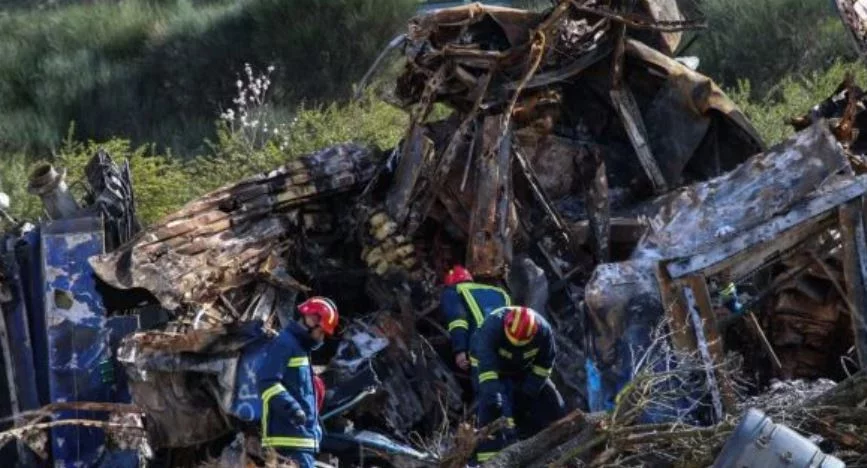
The deadly train collision in north-central Greece on Tuesday night not only revealed to the world the antiquated and ultimately unsafe condition of the country’s paltry – by European standards – rail network, but also the long-standing scourge of vandalism and theft that plagued this transportation medium.
The official death toll, as of Monday, was 55, although the identification of victims continues amid the wreckage, the result of two trains colliding head-on before midnight on Tuesday, just north of the central city of Larissa and before entering the Tempi Valley Gorge. The north-bound passenger train, operated by FS’s subsidiary in Greece, Hellenic Rail, was switched onto the wrong tracks and into an oncoming south-bound freight train, with initial indications pointing to human error.
Repeated and continuous thefts of high-voltage electricity cables along the tracks, break-ins of unguarded Hellenic Railways Organisation (OSE) warehouses containing expensive equipment and materials and even the removal of nuts and bolts holding together rails are a worrying but frequent occurrence in the country.
In one characteristic instance dating back to 2011, a gang of juveniles had cut, with blow torches, seven rails measuring roughly three meters in length, and with each rail weighing 500 kilos. That incident remained “innocuous” for the network’s operation, given that it occurred on an old rail line, however, the systemic theft and vandalism targeting the (few) main lines continued to threaten the safety of passengers and crews.
By all accounts, this situation has plagued the rail network in Greece for at least the past 20 years, despite the arrests made from time to time by police and the eradication of organized gangs of “metal hunters”.
According to authorities and from numerous media reports, most, but not all of the gangs targeting the rail network are comprised of Roma (gypsy) community members, with the modus operandi involving the quick cutting of cables to subsequently retrieve the copper inside for sale to foundries and scrap yards.
Sources that spoke to in.gr in the wake of the deadly train collision cited annual damages of between seven to 10 million euros.
Besides of decades of operational mismanagement, government indifference, and the squandering of national and EU funds aimed to modernize the rail system, nary an investigation has ever focused on scrap yards in the country accepting and paying for copper and other recyclable metals without inquiring over their whereabouts, or possibly even issuing payment invoices.
Another parameter, however, in the systematic looting of state-run OSE assets doesn’t involve authorities’ efficiency in disbanding organized metal stealing gangs, but rather – as employees have long charged – the stealing of equipment and material in order to oblige the company – i.e. taxpayers – to replace them, resulting in new orders worth millions of euros.
The price of the stolen cables and equipment is compounded by the costs of repairs and installation, usually conducted by private contractors.
One very recent document, dated Jan. 31, 2023, in fact, approves a contract to guard rail lines and railroad infrastructure with the use of drones.
Since last summer, meanwhile, monthly and two-month contracts are renewed with security firms, in order to achieve better results in guarding the network, even with the use of drones and even at night.
The contracts also referred to the word “sabotage”, essentially upgrading the problem from mere theft of valuable metals to intentional damage in order to oblige OSE to order new materials and to pay for installation.
Latest News

WTTC: Travel & Tourism to Create 4.5M New Jobs in EU by 2035
This year, international visitor spending is set to reach 573 billion euros, up by more than 11% year-on-year

IMF: US Tariffs Shake Global Economy, Outlook Downbeat
IMF slashes global growth forecast to 2.8% as U.S. tariffs create uncertainty and ‘negative supply shock

First Step Towards New Audiovisual Industry Hub in Drama
The project is set to contribute to the further development of Greece’s film industry and establish Drama as an audiovisual hub in the region

Airbnb Greece – Initial CoS Ruling Deems Tax Circular Unlawful
The case reached the Council of State following annulment applications filed by the Panhellenic Federation of Property Owners (POMIDA)

Mitsotakis Unveils €1 Billion Plan for Housing, Pensioners, Public investments
Greek Prime Minister Kyriakos Mitsotakis has announced a new set of economic support measures, worth 1 billion euros, aiming to provide financial relief to citizens.

Alter Ego Ventures Invests in Pioneering Gaming Company ‘Couch Heroes’
Alter Ego Ventures' participation in the share capital of Couch Heroes marks yet another investment by the Alter Ego Media Group in innovative companies with a focus on technology.

Corruption Still Plagues Greece’s Driving Tests
While traffic accidents continue to claim lives on Greek roads daily, irregularities and under-the-table dealings in the training and testing of new drivers remain disturbingly widespread

Pope Francis Died of Stroke and Heart Failure Vatican Confirms
As news of the official cause of death spread, tributes poured in from across the globe. The 1.4 billion-member Catholic Church is united in grief, remembering a pope who championed inclusion, justice, and compassion

Increase in Both Museum Visits, Revenues for 2024
As expected, the Acropolis was the top archeological site in the country, followed by Sounion, Mycenae, the ancient theater of Epidaurus, and Vergina in northern Greece

Where Greece’s Tourists Come From: A Look at 2025’s Top Visitor Markets
The United Kingdom continues to hold the top spot as the largest source of incoming tourism, with 5.6 million seats booked for Greece this summer — up 2.2% from last year. This accounts for 20% of all international air traffic to Greece
















![Ξενοδοχεία: Μεγάλο το ενδιαφέρον για επενδύσεις στην Ελλάδα – Η θέση της Αθήνας [γραφήματα]](https://www.ot.gr/wp-content/uploads/2025/03/Athens-hotels-90x90.jpg)
























 Αριθμός Πιστοποίησης
Αριθμός Πιστοποίησης